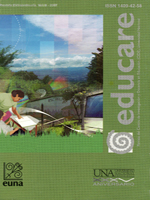Migración, diversidad y el aula escolar
DOI:
https://doi.org/10.15359/ree.2-Ext.7Keywords:
migrations, diversity, classroom, curriculum, elementary school, teacherAbstract
Migrations seems to be an historical constant that have influenced what we are today. Costa Rica receives thousands of inmigrants every year, especially from the neighboring country, Nicaragua. Their presence has transformed our economic and social reality, but mainly it has had a great influence in the dynamic of educational institutions. Therefore, school teachers must be prepared to attend a diverse population, making an effort to offer an education of quality that takes into consideration characteristics of all the actors involved in the process. In order to achieve this, it will be necessary to consider social, economic and emotional aspects, as well as to work for the addition of different elements in the curriculum that allow migrant students to be inserted by providing them a meaningful learning process. Respect for diversity must be achieved by means of an effort to supply a deeper view of the other and its differences, transforming the classroom in an inclusive space for all students.
References
Acuña, G. y Olivares, E. (1999). "La población migrante nicaragüense en Costa
Rica: realidad y respuestas". Fu,ndación Arias para la Paz y el Progreso Humano.
Recuperado en: http: www.nacion.co.cr/ln _ ee/ESPECIALES/nicaragua/paz.html
Alvarenga, P. (1997). "Conflictiva convivencia de los nicaragüenses en Costa Rica".
Cuaderno de Ciencias Sociales 101. San José, Costa Rica: FLACSO.
Azofeifa, F., Monge, M., Vidal, M. y Céspedes, E. (2001). Diversidad e integración
cultural. Heredia, Costa Rica: CIDE, OIM, MEP, UNA, USAID.
Barth, L. y Díaz, S. (2000). Diversidad e integración cultural. Módulo l. San José,
Costa Rica: Arte e Imagen.
Contreras, V. y Robert, A. (2000). Ampliación de la capacidad del sistema educativo
costarricense en comunidades afectadas por la migración nicaragüense_
relacionada con el huracán Mitch. Costa Rica: Servicios Litográficos Barsant
S.A.
Gutiérrez, F. y Prieto, D. (1991). La mediación pedagógica. San José, Costa Rica:
RNTC.
James, D. (1997a). "Coping with a new society: the unique psychosocial problems
of inmigrant youth". The Journál ofSchool Health, 67, 98-102.
James, D. ( 1997b). "Psychosocial risks of inmigrant students". The Education Digest,
, 51-53. ·
López, M. (s.f.). "La educación intercultural: la diferencia como valor". Recuperado
en: http: www.sauce.cnice.mecd.es/smarti4/lopezm.htm
Mata, A., Monge, M., Pereira, T., Alvarado, R., Gómez, K., Cubero, F. y Frías, C.
(2000a). Módulo 2.1: Educación de Calidad. Costa Rica.
Mata, A., Monge, M., Pereira, T., Alvarado, R., Gómez, K., Cubero, F. y Frías, C.
(2000b). Módulo 2.2: Educar para la diversidad. Costa Rica.
Mata, A., Monge, M., Pereira, T., Alvarado, R., Gómez, K., Cubero, F. y Frías, C.
(2000c). Módulo 2.3: Éxito escolar. Costa Rica.
Perkins, L. (2000). "The new inmigrants and education: challenges and issues".
Educational florizons, 78, 67-71.
Porter, E. y Romo, C. (1999). "¡Abran las puertas!" América Economía, 8 de abril:
-38.
Savater, F. (2001 ). Ética para Amador. Madrid: Ariel.
Vásquez, E. (2004). Propuesta didáctica para la capacitación de docentes en la
atención a los y las niñas(os) migrantes nicaragüenses de la Escuela Nuevo
Horizonte, La Milpa, Heredia. Trabajo final de graduación no publicado, para
optar por el título de Maestría en pedagogía con énfasis en la diversidad en los
aprendizajes. Universidad Nacional, Heredia, Costa Rica.
Published
How to Cite
Issue
Section
License
1. In case the submitted paper is accepted for publication, the author(s) FREELY, COSTLESS, EXCLUSIVELY AND FOR AN INDEFINITE TERM transfer copyrights and patrimonial rights to Universidad Nacional (UNA, Costa Rica). For more details check the Originality Statement and Copyright Transfer Agreement
2. REUTILIZATION RIGHTS: UNA authorizes authors to use, for any purpose (among them selfarchiving or autoarchiving) and to publish in the Internet in any electronic site, the paper´'s final version, both approved and published (post print), as long as it is done with a non commercial purpose, does not generate derivates without previous consentment and recognizes both publisher's name and authorship.
3. The submission and possible publication of the paper in the Educare Electronic Journal is ruled by the Journal’s editorial policies, the institutional rules of Universidad Nacional and the laws of the Republic of Costa Rica. Additionally, any possible difference of opinion or future dispute shall be settled in accordance with the mechanisms of Alternative Dispute Resolution and the Costa Rican Jurisdiction.
4. In all cases, it is understood that the opinions issued are those of the authors and do not necessarily reflect the position and opinion of Educare, CIDE or Universidad Nacional, Costa Rica. It is also understood that, in the exercise of academic freedom, the authors have carried out a rogorous scientific-academic process of research, reflection and argumentation thar lays within the thematic scope of interest of the Journal.
5. The papers published by Educare Electronic Journal use a Creative Commons License:














 The articles published by Educare Electronic Journal can be shared with a Creative Commons License:
The articles published by Educare Electronic Journal can be shared with a Creative Commons License: 



